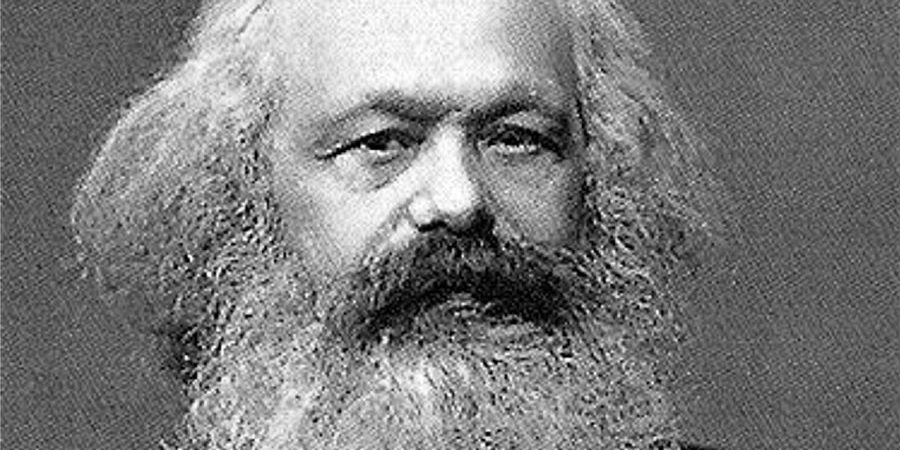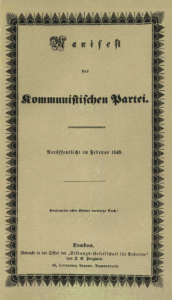 The Communist League, a subversive society bent on inciting riots across the Continent of Europe for the purpose of embracing communism, commissioned Karl Marx on January 26, 1848 to complete his Manifesto by February 1st. Of course Marx had already distilled his ideas after years of reflection, but these ideas and violent methods were so revolutionary that his own name would not appear on the publication until 24 years later in 1872! Once the “48’ers” as they were known began to riot all across Europe, their ideas and methods were condemned and many had to flee for their lives to other nations, including the United States!
The Communist League, a subversive society bent on inciting riots across the Continent of Europe for the purpose of embracing communism, commissioned Karl Marx on January 26, 1848 to complete his Manifesto by February 1st. Of course Marx had already distilled his ideas after years of reflection, but these ideas and violent methods were so revolutionary that his own name would not appear on the publication until 24 years later in 1872! Once the “48’ers” as they were known began to riot all across Europe, their ideas and methods were condemned and many had to flee for their lives to other nations, including the United States!
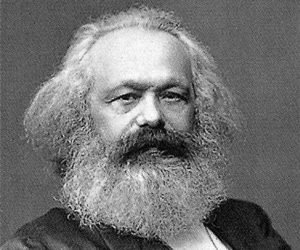 So who was Karl Marx? Raised as a Christian, Marx wrote when only a teen “Union with Christ could give an inner elevation, comfort in sorrow, calm trust, and a heart susceptible to human love, to everything noble and great, not for the sake of ambition and glory, but only for the sake of Christ.” He saw Christ and His love as the true motive for people to get along. Falling out of relationship with his father, who may have been somewhat absent in his life, Marx turned to the occult and the devil. In his poem “Human Pride,” for instance, he writes in parallel to what the Bible says of Satan in Isaiah 14:12-15: “With disdain I will throw my gauntlet, full in the face of the world, and see the collapse of this pygmy giant whose fall will not stifle my ardour. Then will I wander godlike an victorious through the ruins of the world and, giving my words an active force, I will feel equal to the Creator.” Only bent on self, he had no obligation to earn a living, though he was gifted and brilliant. His family was thus abandoned and lived in poverty.
So who was Karl Marx? Raised as a Christian, Marx wrote when only a teen “Union with Christ could give an inner elevation, comfort in sorrow, calm trust, and a heart susceptible to human love, to everything noble and great, not for the sake of ambition and glory, but only for the sake of Christ.” He saw Christ and His love as the true motive for people to get along. Falling out of relationship with his father, who may have been somewhat absent in his life, Marx turned to the occult and the devil. In his poem “Human Pride,” for instance, he writes in parallel to what the Bible says of Satan in Isaiah 14:12-15: “With disdain I will throw my gauntlet, full in the face of the world, and see the collapse of this pygmy giant whose fall will not stifle my ardour. Then will I wander godlike an victorious through the ruins of the world and, giving my words an active force, I will feel equal to the Creator.” Only bent on self, he had no obligation to earn a living, though he was gifted and brilliant. His family was thus abandoned and lived in poverty.
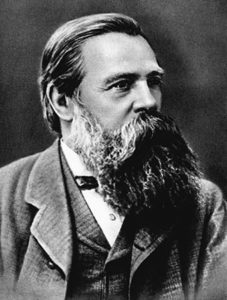 Friedrich Engels, Marx’s friend and co-author of the Communist Manifesto, was also raised as a Christian. However, he began to doubt his faith writing, “I pray every day, indeed almost all day, for truth, and I have done so ever since I began to doubt, but still I cannot go back. My tears are welling as I write.” When he first met Marx, he had called him “the monster possessed by ten thousand devils.” Marx and Engels wrote using all kinds of profanity as well as mocking the very people they were to reach. Marx admitted that “the Communist mob will never love us.” Both Engels and Marx elevated Satanism, slavery, discrimination, and antisemitism while promoting a system that would captivate over a third of the world’s population, leaving them as virtual slaves to their governments.
Friedrich Engels, Marx’s friend and co-author of the Communist Manifesto, was also raised as a Christian. However, he began to doubt his faith writing, “I pray every day, indeed almost all day, for truth, and I have done so ever since I began to doubt, but still I cannot go back. My tears are welling as I write.” When he first met Marx, he had called him “the monster possessed by ten thousand devils.” Marx and Engels wrote using all kinds of profanity as well as mocking the very people they were to reach. Marx admitted that “the Communist mob will never love us.” Both Engels and Marx elevated Satanism, slavery, discrimination, and antisemitism while promoting a system that would captivate over a third of the world’s population, leaving them as virtual slaves to their governments.
After the publication of the Manifesto in 1848 there were uprisings and violent riots all over Europe. Though some view these as spontaneous, unrelated demands by the working class for better conditions and pay, the cause can be traced to the writings of the small pamphlet that claims to be the most read political booklet of all time. These “revolutions” resulted in greater control from government and effectively traded one form of tyranny for another which was worse. The dialectic method of thinking and forced redistribution of wealth made things worse over time. Since the Pilgrims arrived nearly 250 years earlier, what could this Manifesto possibly have to do with them?
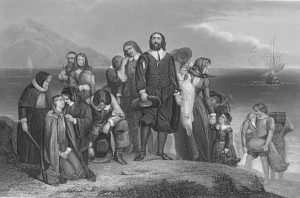 Marx wrote that the goal of his philosophy was communism. Though the word is out of vogue today, the concepts of Marxism and socialism that comprise its ideology of government control and forced redistribution of wealth are still taught on college campuses and universities around the world. The same ideas, in seed form, were practiced in England at the time of the Pilgims. Economic concepts such as the “common field,” “just price” and “wage ceiling” were aspects of government control to eliminate competition, the profit motive and insure that workers were paid a fair share. The financial investors of the Pilgrims were simply applying these accepted concepts and it became “the common course and condition”.
Marx wrote that the goal of his philosophy was communism. Though the word is out of vogue today, the concepts of Marxism and socialism that comprise its ideology of government control and forced redistribution of wealth are still taught on college campuses and universities around the world. The same ideas, in seed form, were practiced in England at the time of the Pilgims. Economic concepts such as the “common field,” “just price” and “wage ceiling” were aspects of government control to eliminate competition, the profit motive and insure that workers were paid a fair share. The financial investors of the Pilgrims were simply applying these accepted concepts and it became “the common course and condition”.
What the Pilgrims did by reasoning from Scripture was to refute the ideas that would one day be called Marxist, socialist and communistic. Marx and Engels did not invent such concepts, they have been around since sin entered the Garden of Eden. William Bradford writes, describing the year 1623;
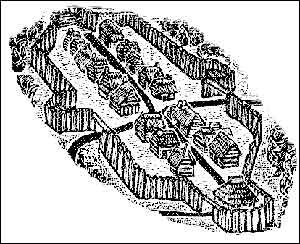 “So they began to think how they might raise as much corn as they could, and obtain a better crop than they had done, that they might not still thus languish in misery. At length, after much debate of things, the Governor (with the adivce of the chiefest among them) gave way that they should set corn every man for his own particular, and in that regard trust to themselves; in all other things to go on in the general way as before. And so assigned to every family a parcel of land, according to the proportion of their number… This had very good success, for it made all hands industrious, so as much more corn was planted than otherwise would have been by any means the Governor or any other could use, and saved him a great deal of trouble, and gave far better content. The women now went willingly into the field, and took their little ones with them to set corn; which before would allege weakness and inability; whom to have compelled would have been thought great tyranny and oppression.”
“So they began to think how they might raise as much corn as they could, and obtain a better crop than they had done, that they might not still thus languish in misery. At length, after much debate of things, the Governor (with the adivce of the chiefest among them) gave way that they should set corn every man for his own particular, and in that regard trust to themselves; in all other things to go on in the general way as before. And so assigned to every family a parcel of land, according to the proportion of their number… This had very good success, for it made all hands industrious, so as much more corn was planted than otherwise would have been by any means the Governor or any other could use, and saved him a great deal of trouble, and gave far better content. The women now went willingly into the field, and took their little ones with them to set corn; which before would allege weakness and inability; whom to have compelled would have been thought great tyranny and oppression.”
Simple study and application of Scripture in the wilderness where no King or constable is looking over your shoulder, produced innovative ideas that set a new direction for the production of corn in 1623. These ideas can be contrasted with the goals of the Communist Manifesto of 1848. The Manifesto called for the abolition of private property, establishment of a graduated income tax, abolition of the right of inheritance (and thus abolition of the family), centralization of the economy, communication, and transportation by the State, factories and production owned by the State, government control of labor, reduction of self-government, and free government education in public schools.
Bradford wrote in affirmation of private property; “…the taking away of property and bringing into community into a commonwealth would make them happy and flourishing; as if they were wiser than God…”; in affirmation of private labor, “For this community… was found to breed much confusion and discontent and retard much employment that would have been to their benefit and comfort.”; and in affirmation of the family, including the primary responsibility of parents to educate their children; “And for men’s wives to be commanded to do service for other men… they deemed it a kind of slavery… it did diminish (those relations that God hath set amongst men).” The Pilgrims brought the simple ideas of self-government, private property, labor and the family to a wilderness, little realizing that they were establishing principles upon which a future nation of liberty would rest. The fact that our nation is practicing more of the ideas of Marx than the Pilgrims illustrates why we must remember our roots!

